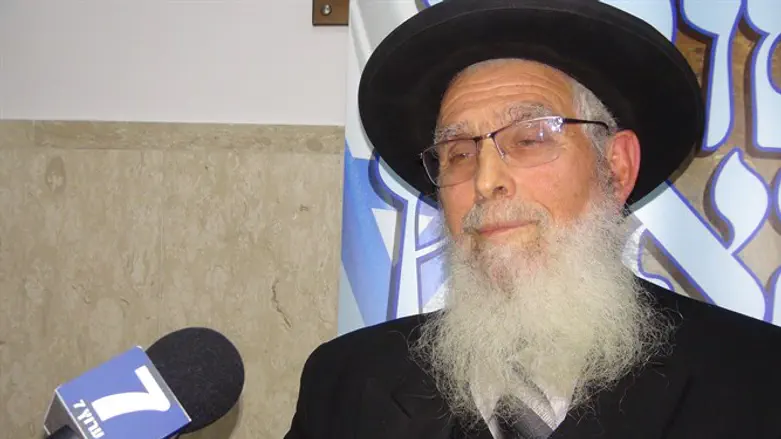
Rabbi Yaakov Ariel, Chief Rabbi of Ramat Gan and President of the Hotam association, one of the most respected leaders and Torah Sages of the religious Zionist sector, reacted to the words of Rabbi Shlomo Riskin with respect to whether active homosexuals can be held accountable for transgressing the Torah prohibiton for the act.
Rabbi Riskin, rabbi of Efrat, Gush Etzion and founding head of Ohr Torah Institutions, was interviewed recently in Hebrew by the Israeli liberal-religious Makor Rishon newspaper, where his unprecedented opinion that homosexuals are in the halakhic category of those held unaccountable for a sin because they are coeced (Ones rachmana patrey, ed.) caused a strong backlash in the Orthodox rabbinic world in Israel – and abroad. Rabbi Riskin excluded "those who could have chosen to lead a heterosexual life and instead chose otherwise."
Rabbis including Rabbi Baruch Efrati of Rabbanei Emunah and internationally known scholar and Bar Ilan lecturer Rabbi Dr. Jeffrey Woolf of Efrat penned responses explaining that this halakhic category refers only to external forces, not to problems of self-control and free will, no matter how difficult.
Two names of world-renowned rabbis who have dealt with the issue are Rabbi Yaakov Meidan, head of the prestigious religious Zionist Har Etzion Hesder Yeshiva in Gush Etzion and Rabbi Aharon Feldman of the also prestigious haredi Ner Yisrael Yeshiva of Baltimore. Both have explained the Torah way of looking at same-sex relations: There is no loophole to allow the act, they say, and observant people who cannot overcome such tendencies are faced with the need to refrain from acting upon them, difficult as that may be. Rabbi Meidan has said that he considers the students who told him that they have decided to live celibate lives because of this prohibition, "tzaddikim."
In a response to Hotam's request for his opinion, Rabbi Ariel wrote that first of all, the Jewish community needs to understand the difficulties inherent in being LGBT, and to draw those suffering from it closer.
"Their lives aren't easy, and in their current state, they cannot build a proper family," Rabbi Ariel wrote, adding that we "should help them financially and emotionally to extricate themselves from this situation, which they did not choose to be in."
"We must explain to them, in a pleasant fashion, that flying the 'pride' flag of being different is not helping them extricate themselves from their difficulties. In fact, it makes their difficulties worse."
Rabbi Ariel also contradicted Rabbi Riskin's declaration that the Torah does not punish homosexuals, since they are considered "forced" to act that way. Though the Torah does not punish a person for something he is "forced" to do, Rabbi Ariel said homosexuality does not fall under that category.
"Anyone who tries to let homosexuals off the hook by saying they are 'forced' to act that way is wrong and misleading," Rabbi Ariel said. "He is only adding to their difficulties, and preventing them from coping. Those who allow an abomination and claim it is not a person's fault, are making a serious mistake." The Torah specifically calls the homosexual act an "abomination."
"According to that, anyone who is not married cannot control themselves and is therefore 'forced' to sin. And any criminal who commits a crime and has a hard time weaning himself off something can simply claim that he was 'forced' and cannot be punished."